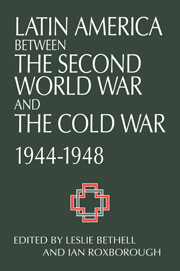Book contents
- Frontmatter
- Contents
- List of contributors
- Preface
- Introduction: The postwar conjuncture in Latin America: democracy, labor, and the Left
- 1 Brazil
- 2 Chile
- 3 Argentina
- 4 Bolivia
- 5 Venezuela
- 6 Peru
- 7 Mexico
- 8 Cuba
- 9 Nicaragua
- 10 Costa Rica
- 11 Guatemala
- Conclusion: The postwar conjuncture in Latin America and its consequences
- Index
1 - Brazil
Published online by Cambridge University Press: 04 May 2010
- Frontmatter
- Contents
- List of contributors
- Preface
- Introduction: The postwar conjuncture in Latin America: democracy, labor, and the Left
- 1 Brazil
- 2 Chile
- 3 Argentina
- 4 Bolivia
- 5 Venezuela
- 6 Peru
- 7 Mexico
- 8 Cuba
- 9 Nicaragua
- 10 Costa Rica
- 11 Guatemala
- Conclusion: The postwar conjuncture in Latin America and its consequences
- Index
Summary
The outbreak of war in Europe in September 1939 forced Getulio Vargas, who had been president of Brazil since the Revolution of 1930 (and dictator since the military coup and foundation of the Estado Novo in November 1937), to reassess the foreign policy he had successfully pursued throughout the 1930s. “Pragmatic equilibrium” between the three Great Powers with major strategic and economic interests in Brazil (the United States, Britain, and Germany) was no longer a viable policy. Brazil's options narrowed; choices had to be made. And despite pro-Axis, indeed profascist, sympathies in many sectors of Brazil's ruling elite, not least in the military high command, and some initial hesitation by Vargas, there was never much doubt that Brazil would eventually be driven by both political and economic considerations to join the United States in support of Britain against Germany. As early as January 1941 Vargas secretly authorized the construction of U.S. air base facilities in the strategically important Brazilian Northeast for a future war against Germany in North Africa in which the state of Natal was to be the “springboard to victory.” In January 1942, after the Japanese attack on Pearl Harbor and the decision of the United States to enter the war and in accordance with agreements made at the Rio Conference of American Foreign Ministers, Brazil abandoned neutrality and broke off diplomatic relations with the Axis powers. In August, after Germany's persistent sinking of Brazilian vessels (with the loss of Brazilian lives), Brazil declared war.
- Type
- Chapter
- Information
- Latin America between the Second World War and the Cold WarCrisis and Containment, 1944–1948, pp. 33 - 65Publisher: Cambridge University PressPrint publication year: 1993
- 1
- Cited by

